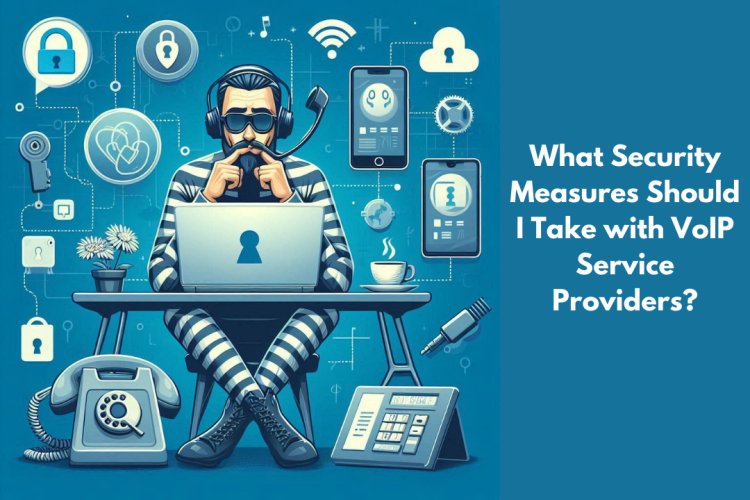What Security Measures Should I Take with VoIP Service Providers?
Share this Post to earn Money ( Upto ₹100 per 1000 Views )
Introduction
Switching to VoIP (Voice over Internet Protocol) offers numerous advantages, from cost savings to advanced features. However, with these benefits come certain security risks. Ensuring your VoIP service is secure is crucial to protect sensitive information and maintain the integrity of your communications. This guide will explore the essential security measures to take with VoIP service providers.
Understanding VoIP Security
VoIP converts voice into digital signals and transmits them over the internet. While this technology provides flexibility and efficiency, it also opens the door to various security threats. Understanding these threats and how to mitigate them is key to maintaining secure communications.
Common Security Threats to VoIP
Before diving into security measures, it's important to recognize common threats to VoIP systems:
-
Eavesdropping: Unauthorized interception of calls.
-
Phishing: Attempts to steal sensitive information through fraudulent communication.
-
Spam over Internet Telephony (SPIT): Unwanted, disruptive calls.
-
Denial of Service (DoS) Attacks: Overwhelming the network to disrupt service.
-
Call Tampering: Interference with call quality and data integrity.
Essential Security Measures
Strong Passwords and Authentication
Strong Passwords and Authentication are the first lines of defense against unauthorized access:
-
Use Complex Passwords: Combine upper and lower case letters, numbers, and special characters.
-
Two-Factor Authentication (2FA): Adds an extra layer of security by requiring a second form of identification.
Encryption
Encryption ensures that even if data is intercepted, it cannot be read by unauthorized parties:
-
End-to-End Encryption: Encrypts data from the sender to the receiver.
-
Secure Real-Time Transport Protocol (SRTP): Encrypts the voice data during transmission.
Secure Networks
A Secure Network infrastructure is essential for protecting VoIP communications:
-
Virtual Private Network (VPN): Encrypts data transmitted over the internet.
-
Segmentation: Separate VoIP traffic from other data to reduce the risk of cross-contamination.
Regular Updates and Patching
Keeping your system up to date is crucial:
-
Regular Updates: Ensure all software and hardware are updated to protect against known vulnerabilities.
-
Patching: Apply patches as soon as they become available to fix security flaws.
Firewalls and Intrusion Detection Systems
Firewalls and intrusion detection systems (IDS) can help monitor and control traffic:
-
Firewalls: Block unauthorized access to your network.
-
IDS: Detect and respond to suspicious activities.
Monitoring and Logging
Continuous monitoring and logging help in early detection and response:
-
Real-Time Monitoring: Keep an eye on network activity to detect anomalies.
-
Logging: Maintain logs of all activities for auditing and analysis.
Choosing a Secure VoIP Service Provider
When selecting a VoIP service provider, consider their security measures:
-
Reputation: Choose providers with a strong track record in security.
-
Encryption Standards: Ensure they use robust encryption protocols.
-
Compliance: Check if they comply with industry standards and regulations.
Best Practices for Users
Users play a crucial role in maintaining security:
-
Training: Educate users about common threats and safe practices.
-
Regular Audits: Conduct security audits to identify and address vulnerabilities.
-
Secure Devices: Ensure all devices used for VoIP are secured with antivirus and anti-malware software.
Real-World Examples
Example 1: Company A
Company A faced repeated phishing attempts targeting their VoIP system. By implementing 2FA and user training, they significantly reduced the incidence of such attacks.
Example 2: Company B
Company B experienced a DoS attack that disrupted their service. They upgraded their network infrastructure and implemented robust firewalls, preventing future attacks.
FAQs
1.What is VoIP security?
VoIP security involves protecting your voice over internet protocol communications from threats such as eavesdropping, phishing, and DoS attacks.
2.How can I ensure my VoIP service is secure?
Implement strong passwords, use encryption, secure your network, keep systems updated, use firewalls and IDS, and continuously monitor and log activities.
3.Why is encryption important for VoIP?
Encryption ensures that even if data is intercepted, it cannot be read by unauthorized parties, protecting sensitive information.
4.What should I look for in a secure VoIP service provider?
Choose providers with a strong reputation, robust encryption standards, and compliance with industry regulations.
5.How can users contribute to VoIP security?
Users can contribute by following safe practices, undergoing regular training, and ensuring their devices are secure.
Conclusion
Ensuring the security of your VoIP communications is crucial for protecting sensitive information and maintaining the integrity of your business operations. By implementing strong security measures and choosing a reliable VoIP service provider, you can enjoy the benefits of VoIP while minimizing risks. Stay proactive and vigilant to keep your communications secure.









![Glycogen Control Canada Reviews [NEW UPDATED 2024] Is It Safe To Use!](https://blog.rackons.in/uploads/images/202406/image_380x226_6660439123268.jpg)